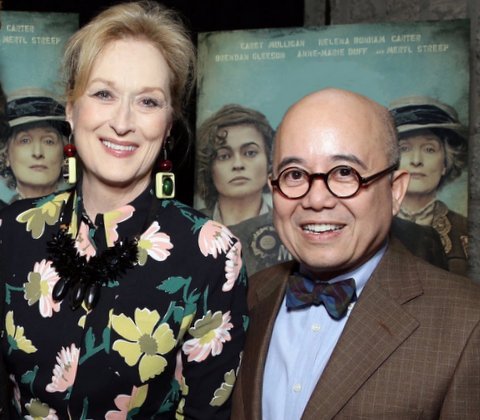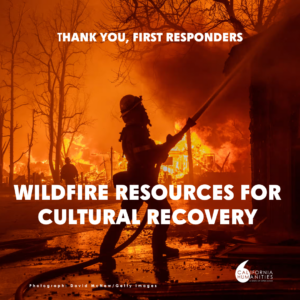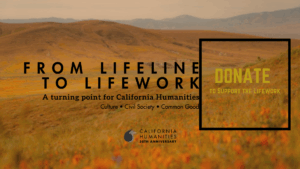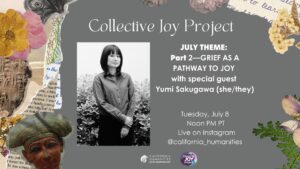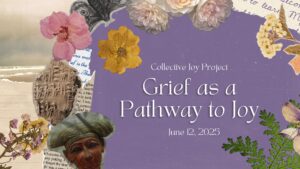Above image: Fritz Friedman, California Humanities Board Member, with actress Meryl Streep.
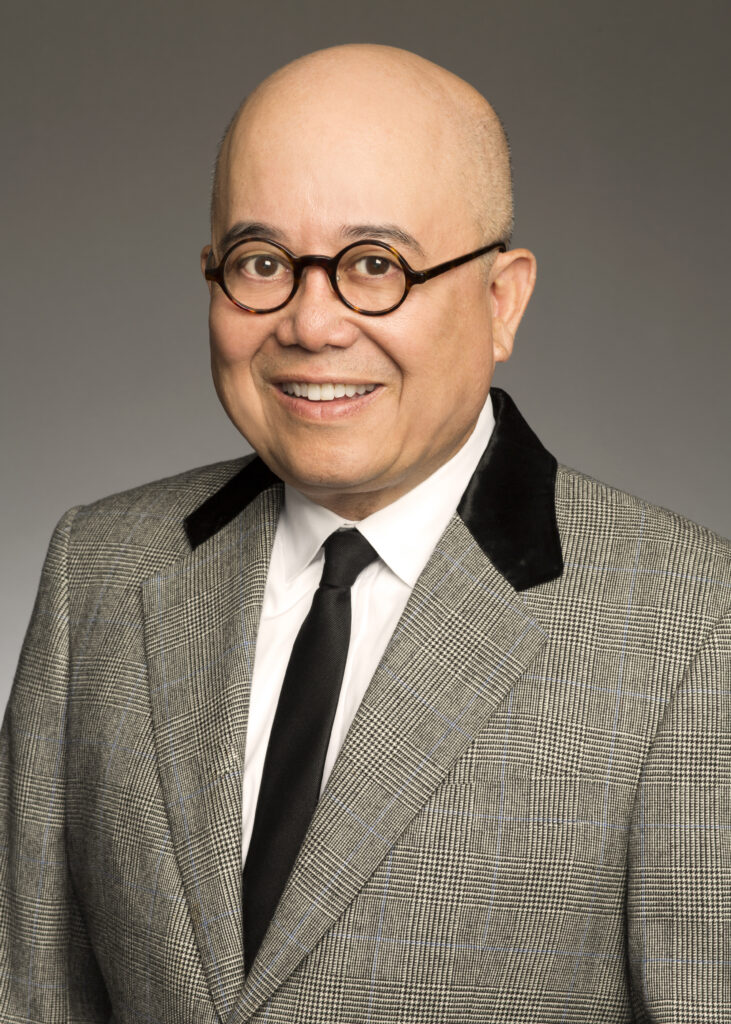
This month we spoke with California Humanities’ longest-serving board member Fritz Friedman, appointed by Governor Jerry Brown. He is President of The Fritz Friedman Co., a Los Angeles and San Diego-based production and marketing company. We asked Fritz to talk about how the humanities intersect with some of his roles past and present as a former Sony Pictures executive and current member of the San Diego Commission for Arts and Culture.
What is your personal connection to the humanities? What do they look like in our day to day lives?
The humanities, whose core disciplines include history, literature, the arts and media, the intellectual areas that make us “human,” permeate and define every aspect of my life – creatively, professionally and existentially – including what I wear, who I hang out with, my chosen forms of entertainment and ultimately to the career I successfully carved out for myself. These personal decisions as to who I am are driven by an aesthetic developed over 7 decades of reading, studying, listening and learning.
My focus on these areas add dimension to my consciousness.
Take, for example, the fact that I went to a Jesuit high school for boys in Boston in the early 1960s where I was given a very traditional classical and religious education – four years of Latin, two years of Homeric Greek. (We had to read The Iliad in its original Greek and The Aeneid in Latin). This knowledge of Greek and Latin gave me a deep familiarity with the etymology of words, those arbitrary sounds which were assigned meaning with the consent of groups of people. Indeed, it was only after a community had agreed to associate specific objects, feelings and logic to these sounds did these “words” have any significance. And the etymology of “community” is from “communicare”: which in Latin means “to share.” Ergo, groups share and agreed to the meaning of words and ideas.
It is said that those who study the classics develop a “symbolic life.” That is, for classicists (and other students of language), many words and images not only have its surface, “manifest” meaning, but many words also possess a “latent meaning” based on its origin. This latent meaning provides the rich subtext and nuance created by understanding how words have come about.
The tools given to us by the humanities are, in turn, able to create “communities” who can share, understand, and appreciate the meaning and history of other cultures and their respective tradition and histories.
You worked for Sony Pictures for many years, and we know that Hollywood is all about storytelling. How do you see the film industry developing in the future?
Storytelling is at the core the humanities – whether it’s the through oral, written, or pictorial means being passed down from generation to generation. Of course, among all the other media platforms (print, broadcast, internet), film is one of the most powerful and pervasive vehicles for storytelling in our society. Thanks to its powerful sound and imagery enhanced by amazing, ground-breaking special effects and computer-generated imagery, the cinema is a formidable vehicle to entertain as well as inspire and educate. The world of fantasy can now be experienced.
However, many social commentators have criticized today’s hugely influential film industry as being too profit-driven and subsequently avoiding riskier, creatively enlightening stories in favor of banal, formulaic commercial content which are proven money-makers. The danger is that these stories limit the ability of viewers to develop and appreciate a broader universe of ideas and creative thought.
But not all is lost.
New distribution platforms like streaming services on both mobile devices and home theaters have provided an important and rich option for creativity and artistic experimentation which can stimulate both the imagination as well as satisfy the basic need to understand life, history, and the world. The downside is that the esoteric nature of most of this “art house” content attracts a smaller audience and does not generate as much revenue as, for example, the Marvel franchise. And with little demand, there follows little supply. Art vs. commerce.
But thank goodness there are still those content creators with creative, inquisitive, and brave commitments to their personal visions who are willing to take creative risks in order to enrich the cultural and artistic global environment and broaden the audience’s world view.
As a member of the San Diego Commission for Arts and Culture and also the Creative Committee of the AAPI Caucus of the DNC, why are the arts and humanities important in the government arena?
I believe strongly in the transcendent power of the arts and humanities to transform individuals and unite disparate communities. Government bodies such as the San Diego Commission for Arts and Culture and the DNC’s AAPI Creative Committee also share in this belief that the humanities and the arts are important agents of civic change and improvement. In this current divisive political and social environment, the need to develop a healthy and empathetic understanding of different cultures, religions, and political attitudes is critical to insure a healthy and robust democracy. The study of political history, ethics, and philosophy lie at the center of developing “critical thought,” the sort of perspective necessary to fight authoritarian bias and the subsequent policies that warp the truth.
In her brilliant and insightful book, “Not for Profit: Why Democracy Needs the Humanities,” Martha C. Nussbaum lays out clearly the premise that “critical thinking…is necessary for independent action and for intelligent resistance to the power of blind tradition and authority.”
This healthy respect and strong familiarity with the humanities gives those in government the historical context to truly understand the civic importance and benefits of diversity in philosophy, race, and politics in society.
By studying the humanities, the individual is given the historical and evolutionary context of a society’s moral and ethical values and to understand each community’s basic, shared humanity and equality.

